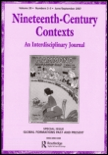
Nineteenth-Century Contexts-An Interdisciplinary Journal
Scope & Guideline
Fostering Insightful Dialogues on 19th Century Dynamics
Introduction
Aims and Scopes
- Interdisciplinary Analysis of Literature:
The journal emphasizes the importance of analyzing nineteenth-century literature through various lenses, including historical, cultural, and sociopolitical contexts, fostering a comprehensive understanding of texts and their implications. - Exploration of Social Issues and Identities:
There is a strong focus on social issues such as class, gender, race, and sexuality, examining how these identities and struggles are represented in literature and how they reflect broader societal changes. - Cultural and Historical Contextualization:
The journal aims to situate literary works within their historical contexts, examining how events, movements, and ideologies of the nineteenth century influence literary production and reception. - Engagement with Contemporary Themes:
The journal also seeks to connect historical narratives with contemporary issues, exploring how the past informs current understandings of identity, culture, and politics. - Innovative Methodological Approaches:
The inclusion of diverse methodologies such as ecocriticism, gender studies, and postcolonial theory highlights the journal's commitment to innovative and evolving scholarly practices.
Trending and Emerging
- Ecological Criticism and Environmental Themes:
A rising trend in the journal is the focus on ecological criticism, reflecting a growing interest in how literature engages with environmental issues, sustainability, and the Anthropocene. - Intersectionality in Identity Studies:
Emerging discussions on intersectionality highlight the complexities of identity, exploring how overlapping social categories such as race, gender, and class interact and shape literary narratives. - Transnational Perspectives:
There is an increasing emphasis on transnational studies, examining how global exchanges and influences shape nineteenth-century literature and cultural production. - Digital Humanities and New Media:
The integration of digital humanities methods is gaining traction, with studies exploring the impact of emerging media technologies on literature and culture during the nineteenth century. - Reinterpretation of Canonical Texts:
Contemporary re-readings of canonical texts to highlight marginalized voices and perspectives are becoming more prevalent, indicating a shift towards inclusivity in literary scholarship.
Declining or Waning
- Traditional Historical Narratives:
There appears to be a waning interest in straightforward historical narratives that do not engage with broader theoretical frameworks or contemporary relevance, as scholars lean towards more complex interpretations. - Romanticism's Dominance:
The focus on Romantic literature, while still present, seems to be overshadowed by a growing interest in Victorian and post-Victorian contexts, indicating a shift in scholarly priorities. - Classical Literary Analysis:
Traditional approaches to literary analysis that prioritize textual analysis without interdisciplinary connections are becoming less common, as the journal increasingly emphasizes interdisciplinary methodologies. - Conventional Gender Studies:
While gender remains a critical area of study, there is a noticeable decline in conventional explorations of gender roles in favor of more nuanced discussions of intersectionality and fluid identities.
Similar Journals
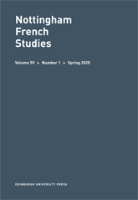
NOTTINGHAM FRENCH STUDIES
Unveiling the Rich Tapestry of French History and LiteratureNOTTINGHAM FRENCH STUDIES is a distinguished academic journal published by Edinburgh University Press, focusing on the diverse realms of French language, literature, culture, and history. With its ISSN 0029-4586 and E-ISSN 2047-7236, the journal serves as a vital platform for scholarly discourse, featuring interdisciplinary research that bridges gaps between Cultural Studies, Linguistics, and Literary Theory. Notable for its robust performance, it holds a Q3 ranking in Cultural Studies and Linguistics and a Q2 ranking in Literature and Literary Theory as of 2023, placing it among the key publications within its field. Throughout its publication span from 1996 to 2024, NOTTINGHAM FRENCH STUDIES has consistently catered to the academic community with insightful articles, enriching the understanding of French cultural contexts. While it is not an Open Access journal, its contributions are pivotal in advancing scholarly dialogue and fostering critical perspectives, making it an essential resource for researchers, professionals, and students engaged in French studies and its interdisciplinary connections.
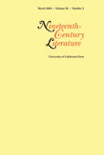
NINETEENTH-CENTURY LITERATURE
Decoding the Complexity of 19th-Century Literary WorksNineteenth-Century Literature, published by University of California Press, stands as a vital resource for scholars and enthusiasts of literature and literary theory. With an ISSN of 0891-9356, this esteemed journal explores the multifaceted dimensions of 19th-century literary works, offering critical analyses and innovative perspectives that advance the discourse in this pivotal era of literature. It holds an impressive ranking of Q3 in the Literature and Literary Theory category, with a Scopus rank of #417 out of 1106, placing it in the 62nd percentile globally. The journal, which has been disseminating knowledge since 1986 and will continue through 2024, is committed to publishing high-quality research that challenges conventional interpretations and engages with contemporary literary debates. Although it currently does not offer open access, its comprehensive scope and rigorous scholarship make it an essential platform for academics aiming to deepen their understanding of 19th-century literature.
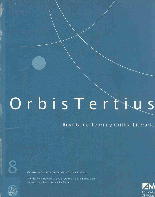
Orbis Tertius
Exploring the Depths of Humanities and EducationOrbis Tertius is an esteemed academic journal published by the National University of La Plata, Faculty of Humanities and Educational Sciences, dedicated to the multifaceted fields of humanities, social sciences, and educational research. Since its inception in 1996, this Open Access journal has been committed to facilitating the dissemination of scholarly work that fosters critical thinking and dialogue amongst researchers and practitioners from diverse backgrounds. With a focus on innovative methodologies and interdisciplinary approaches, Orbis Tertius serves as a platform for high-quality research that enriches our understanding of complex societal issues. The journal’s accessibility ensures that valuable insights are available to a global audience, making it a vital resource for academics, students, and professionals striving for excellence in their respective fields. Located in La Plata, Argentina, it invites contributions that reflect the dynamic nature of contemporary humanities and educational practices.

J19-The Journal of Nineteenth-Century Americanists
Exploring the Depths of 19th Century American ThoughtJ19 - The Journal of Nineteenth-Century Americanists is a prominent academic journal published by Johns Hopkins University Press, dedicated to exploring the rich tapestry of American literature, history, and cultural studies from the 19th century. With its ISSN 2166-742X and E-ISSN 2166-7438, this journal is positioned within the scholarly landscape as an essential resource for researchers and students alike, providing critical insights and innovative scholarship that reflect the complexities of the era. Although currently categorized in Quartile 4 across various fields—including Cultural Studies, History, and Literature and Literary Theory—the journal fosters an inclusive platform for emerging voices and methodologies that interrogate the narratives and ideologies of nineteenth-century America. Its convergence of perspectives, from literary analysis to historical critique, is vital for advancing discussions in this pivotal period of literature and culture. By prioritizing open dialogue and interdisciplinary approaches, J19 serves as a crucial forum for academics interested in the evolution of American thought and creativity during one of its most transformative centuries.
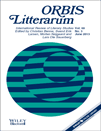
ORBIS LITTERARUM
Advancing Scholarly Insights in Literary TheoryORBIS LITTERARUM, published by Wiley, is a prestigious journal in the field of Literature and Literary Theory, aiming to foster in-depth scholarly discussions and critical analyses of literary works and their theoretical underpinnings. With its ISSN 0105-7510 and E-ISSN 1600-0730, the journal presents a rich legacy that spans several decades, having converged its publishing efforts from 1943 to 1950 and from 1954 to the present day, thus ensuring a continuity of discourse in the literary field. Recognized for its high quality, ORBIS LITTERARUM is ranked in the Q2 quartile of literature disciplines as per the 2023 metrics, placing it within the top 26% of its category and earning a favorable position in the Scopus Rankings with a percentile of 74 in the arts and humanities. Researchers, professionals, and students alike are encouraged to contribute to this esteemed journal to engage with contemporary literary debates and to influence future scholarship in literature, enhancing understanding of texts across cultures and epochs.

Cuadernos de Literatura del Caribe e Hispanoamerica
Illuminating the Literary Landscapes of the Hispanic WorldCuadernos de Literatura del Caribe e Hispanoamerica is a prestigious academic journal published by UNIV ATLANTICO, FAC CIENCIAS HUMANAS, dedicated to advancing scholarly discourse in the field of Caribbean and Hispanic literature. With a focus on the rich cultural narratives and literary expressions that emerge from this vibrant region, the journal aims to serve as a vital resource for researchers, professionals, and students alike. It primarily publishes original research articles, critical essays, and book reviews, contributing to the understanding of the diverse literary landscapes of the Caribbean and Hispanic world. Although it currently does not offer Open Access, the journal's commitment to quality scholarship is reflected in its comprehensive editorial standards and rigorous peer-review process. Positioned within a global context, it serves as an invaluable platform for interdisciplinary dialogue and research dissemination, fostering a deeper appreciation of the literary heritage and contemporary issues faced by these communities.
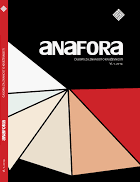
Anafora
Fostering inclusive dialogue in humanities and social sciences.Anafora is an essential open-access journal published by the University of Osijek, Faculty of Humanities & Social Sciences, contributing to the dynamic fields of Communication, Cultural Studies, and Literature and Literary Theory. Since its inception in 2014, the journal has committed itself to disseminating innovative research and critical analysis, attracting a diverse array of scholars and practitioners from across the globe. Based in Croatia, Anafora's content is accessible to all, fostering inclusivity and collaboration within academia. While the journal currently holds a Q4 ranking in both Communication and Cultural Studies, and a Q3 in Literature and Literary Theory as of 2023, its growth trajectory indicates a promising future for the contributions it gathers. Researchers, students, and professionals alike are encouraged to engage with this platform to explore the multifaceted aspects of human expression and cultural discourse, thereby enriching the scholarly conversation within these pivotal domains.

Novoe Literaturnoe Obozrenie
Exploring the Intersection of Culture and LiteratureNovoe Literaturnoe Obozrenie, an esteemed publication dedicated to the realms of Cultural Studies and Literature and Literary Theory, serves as a vital resource for scholars and professionals alike. Published by NOVOE LITERATURNOE OBOZRENIE-NEW LITERARY OBSERVER in the Russian Federation, this journal provides critical insights and scholarly critiques that reflect the evolving landscape of literary discourse. With an established H-index and a focus on fostering academic inquiry, the journal has secured its place amidst contemporary scholarly discussions, indexed in Scopus with rankings that illustrate its commitment to quality despite a current presence in the lower quartiles. Novoe Literaturnoe Obozrenie is a non-open-access journal, encouraging a traditional yet scholarly approach to literary studies and remains an essential read for researchers, students, and professionals that seek to deepen their understanding of literature’s impact on culture and society. Publishing from 2016 until 2024, it continues to bridge theoretical frameworks with practical discourse, making significant contributions to the fields it encompasses.
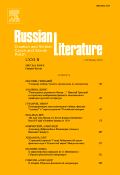
RUSSIAN LITERATURE
Exploring the Depths of Russian Literary HeritageRUSSIAN LITERATURE is a premier academic journal published by ELSEVIER, dedicated to advancing the study of Russian literary traditions, critical theory, and cultural contexts. With an ISSN of 0304-3479 and an E-ISSN of 1878-3678, this journal has firmly established itself as a vital resource in the field, achieving a commendable Q1 ranking in Literature and Literary Theory as of 2023. The journal benefits from a strong impact factor and ranks #178 out of 1106 in the Scopus database, placing it in the 83rd percentile of arts and humanities research. RUSSIAN LITERATURE covers an extensive timeline, converging years from 1971 to 1974 and from 1976 to 2023, reflecting its rich academic lineage. Although not an open-access publication, the journal remains influential among scholars, professionals, and students seeking in-depth analyses and critical insights into Russian literature and literary theory. Its commitment to scholarly rigor makes it an essential read for anyone engaging with the complexities of literary studies.
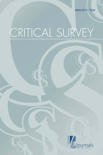
Critical Survey
Decoding the Dynamics of Literature and SocietyCritical Survey, published by BERGHAHN JOURNALS, is a distinguished academic journal that focuses on the dynamic intersections of Cultural Studies and Literature and Literary Theory within the arts and humanities landscape. With an ISSN of 0011-1570 and E-ISSN 1752-2293, this journal serves as a crucial platform for scholars, offering original research and critical essays that delve into contemporary cultural and literary debates. Based in the United Kingdom, it enjoys a solid reputation as evidenced by its 2023 Scopus rankings, placing it in the Q3 category for Cultural Studies and Q2 for Literature and Literary Theory. While it does not currently offer open access options, the journal is committed to maintaining high academic standards and fostering intellectual exchange through its published content, inclusive of articles that span a range of topics relevant to critical survey methodologies. As it continues to converge from 2012 to 2024, Critical Survey remains an invaluable resource for researchers, professionals, and students engaged in the evolving discourse of cultural and literary analysis.